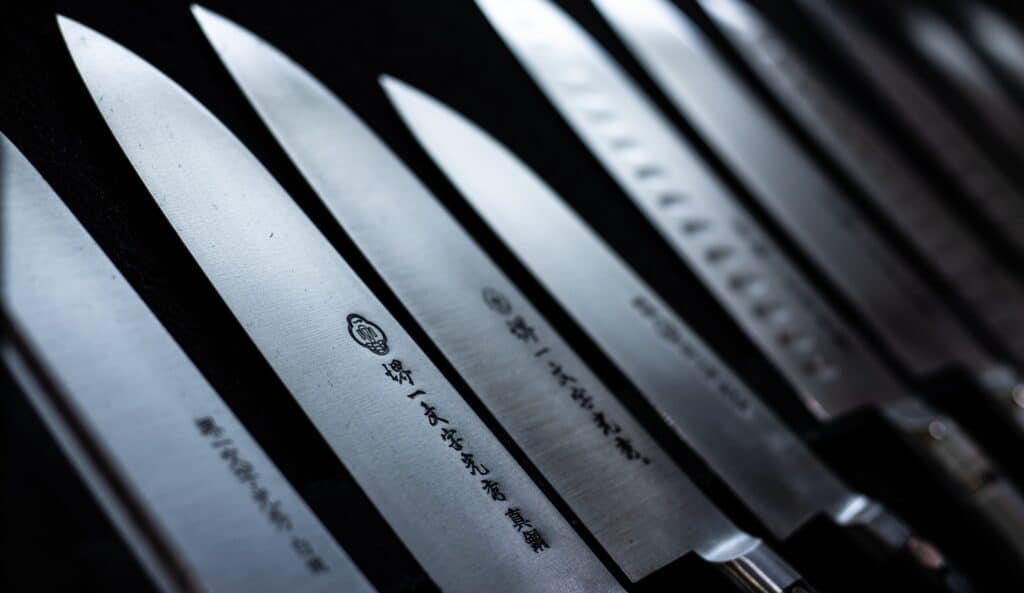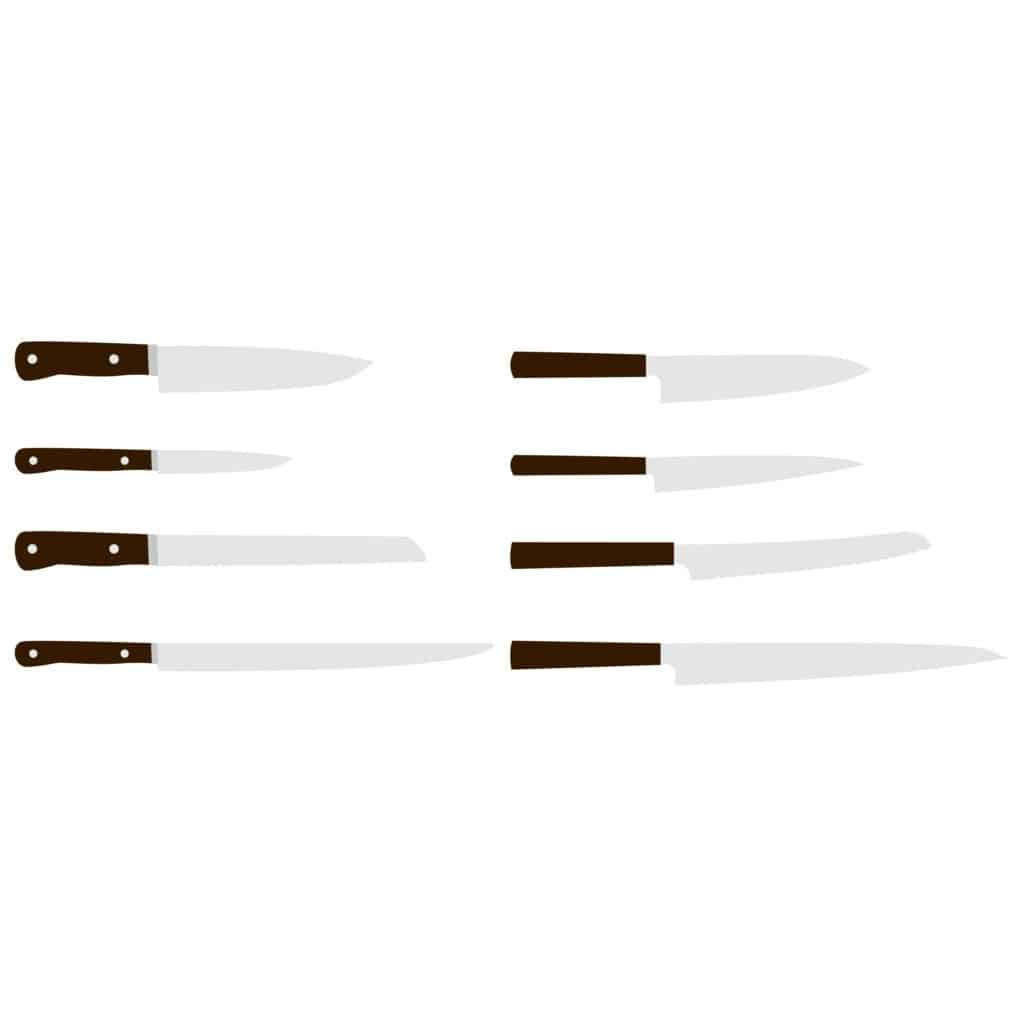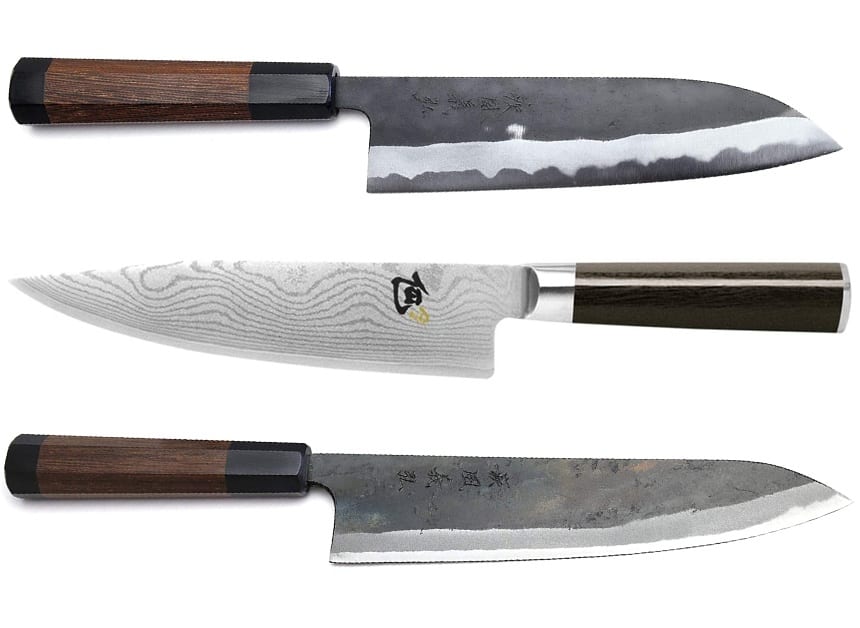
High carbon steel knives are increasingly being seen as a sign of quality, an example of fine craftsmanship. As more and more people are beginning to take an interest in using quality tools for home cooking the demand for quality knives is increasing every year.
Japanese knives are also seeing a surge in their popularity from areas outside of Japan. They too are known for their quality and any research into Japanese knife design will quickly unveil that high carbon steels form an integral role in their quality.
This article will guide you through some of my recommendations of terrific Japanese knives using high carbon steel. I’ll look at knife sets, chef’s knives, Gyuto’s and Santoku knives, all made in Japan, I’m sure you’ll find something that suits your needs.
My personal recommendation would be the Shun Classic 6-Piece knife set. It’s a quality set of high carbon knives made in Japan with a great balance of strength and durability. By buying a knife set you also get a significant price reduction compared to buying individual knives.
View My Top Recommendation
Take a look at the Shun Classic 6-Piece knife set on Amazon here (opens new tab).
What’s the definition of a carbon steel knife
There is no internationally accepted requirement for how much carbon is required for a knife to be considered carbon steel, or as they are usually referred to, a high carbon steel knife.
You may often find knives being advertised as a carbon steel knife, when in fact they contain a pretty standard amount of carbon.
Many people consider anything above 0.6% to be a high carbon knife. Personally, I think this is too low a limit. If you’re looking for a truly high carbon knife I think you need to be looking at knives with at least 1% carbon content.
It’s at those standards of carbon knives where you are able to sharpen a blade within the 8 – 12 degree range, which produces a super sharp knife. Any lower carbon content than 1% and the steel will struggle to keep such a fine edge for very long.
So in this article, all the knives I am going to recommend will be made using steels of above 1% carbon content.
And for complete transparency, I’ve researched each steel to find as exact a carbon content for each knife, you’ll clearly see how the price generally correlates with the carbon content too.
7 Best Japanese Carbon Steel Knives
| Type | Name | Price | Carbon content | Check current price |
| Knife set | Shun Classic 6-Piece Knife Block Set | $400 – $430 | 1.20% | Link to Amazon |
| Knife set | Miyabi 7-Piece Knife Block Set | $650 – $750 | 1.25 – 1.45% | Link to Amazon |
| Chef’s knife | Yoshihiro 8.25 Inch High Carbon Gyuto | $200 – $230 | 1.35% | Link to Amazon |
| Chef’s knife | Shun Classic 8 Inch Chef’s Knife | $170 – $190 | 1.20% | Link to Amazon |
| Chef’s knife | Miyabi Fusion 8 Inch Chef’s Knife | $160 – $180 | 1% | Link to Amazon |
| Santoku | Yoshihiro 7 Inch High Carbon Santoku | $180 – $200 | 1.40%-1.50% | Link to Amazon |
| Santoku | Shun 7 Inch hollow Santoku | $70 – $90 | 1% | Link to Amazon |
Best carbon steel knife sets
First of all, I’m going to recommend two carbon steel knife sets. These are a great choice if you’re looking for a range of carbon steel knives.
When it comes to any quality knife set, the overall price tag often looks high, but when you break that down to a cost per knife basis you’re usually saving a significant amount.
Shun Classic 6-Piece Knife Block Set
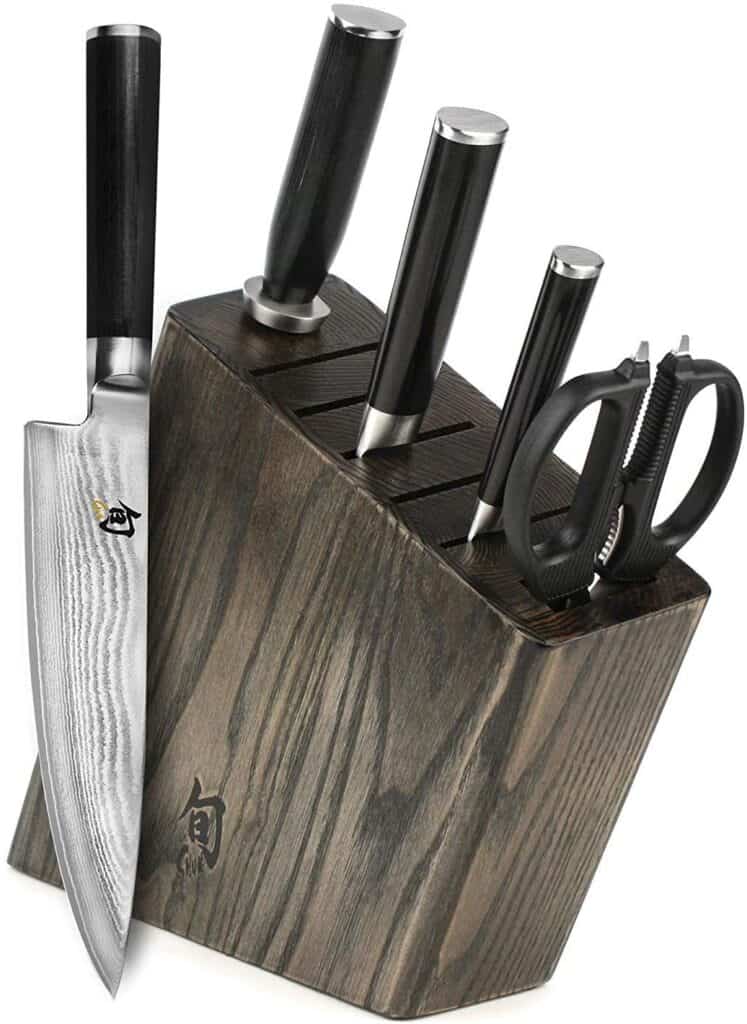
View on Amazon (opens new tab)
Shun Classic 6-piece Knife Block Set Review Table
| Country of manufacture | Japan |
| Steel type | VG-MAX (Durable and hard Japanese steel) |
| Carbon content | 1.20% |
| Rockwell hardness | HRC 61 |
| Factory edge | 16 degrees (double bevel) |
| Handle material | Pakkawood (wood/resin composite) |
| Pros | Very sharp and extremely rust resistant |
Shun has been making knives in the city of Seki, Japan for over 100 years.
Here’s a little tip for you when looking for Japanese knives, Seki is the traditional knife capital of Japan. Many high-quality Japanese knife brands manufacture there, so any time you see a knife that has been made in Seki, it’s pretty likely to be a good one.
Anyway, back to Shun. This Japanese company has infiltrated the western market very well, whilst still offering traditionally styled Japanese knives.
I think this is partly due to their understanding of what many western consumers want. Some other Japanese brands can be a bit daunting, offering knife designs that are really quite different from what western consumers are used to.
That’s not the case with Shun, the chef’s knife, Santoku and paring knife will all be familiar designs to people who enjoy cooking, whilst still being strikingly Japanese in their design and materials used.
The steel used kind of replicates that idea of adapting to a western market. It’s a Japanese steel made specifically by Shun called VG-MAX.
VG-MAX has a high carbon content of 1.2%, allowing for a very sharp edge, but it also includes a heavy amount of chromium at 16%. Chromium is the element that makes stainless steel rust-resistant and technically anything above 10.5% can be considered stainless steel.
That makes these Shun knives very durable, a 16% chromium steel is very high-quality stainless steel.
Traditionally, high carbon knives have been prone to rust, but companies like Shun are realizing the market for a high carbon, yet durable knife, and that’s exactly what you get with this fantastic set.
The blades are full tang into PakkaWood handles. PakkaWood is a resin composite wood that is often used as the material for Japanese knife handles due to its strength and extreme durability, it also provides a nice, natural aesthetic to the knives.
Overall it’s a quality set, and with the Chef’s knife costing between $150 – $200 alone if you bought it separately, the whole set offers good value for money.
Miyabi 7-Piece Knife Block Set
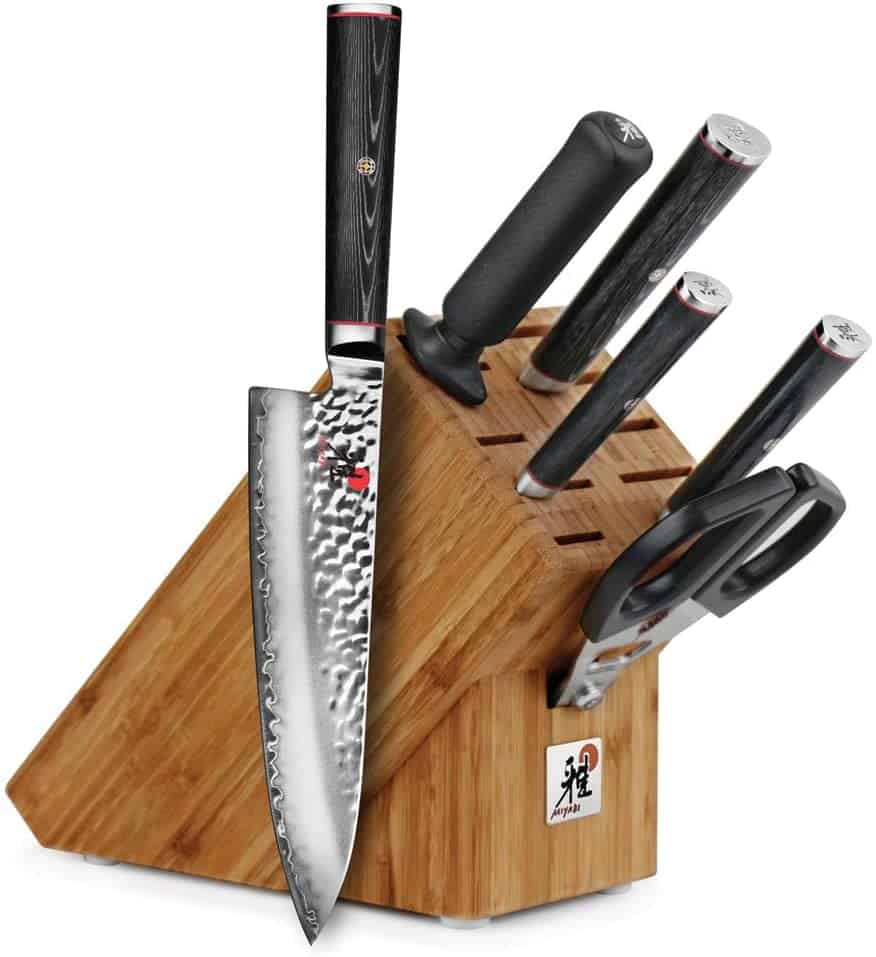
View on Amazon (opens new tab)
Miyabi 7-Piece Knife Block Set Review Table
| Country of manufacture | Japan |
| Steel type | SG2 power steel (Durable and hard Japanese steel) |
| Carbon content | 1.25 – 1.45% |
| Rockwell hardness | HRC 63 |
| Factory edge | 12 degrees (double bevel) |
| Handle material | Micarta (carbon fiber & thermoplastic composite) |
| Pros | Very sharp and extremely rust resistant |
Miyabi are another Japanese knife manufacturer located in the legendary knife city of Seki in Japan.
Though they are Japanese knives, you’ll probably recognize the general styles of the four very useful knives included. The bread knife, chef’s knife, utility and paring knife are quite standard in western kitchens and these four knives will easily be able to cover almost all of your food preparation tasks.
The steel used in these Miyabi knives is SG2 power steel with a hammered Damascus finish. It’s a Japanese steel used for its combination of high carbon and high chromium content, making it both hard and very resistant to rust.
That carbon content is between 1.25 – 1.45% and the chromium lies at 14 – 16%, making it equal in rust resistance to many high-end western stainless steel knives, but with a higher carbon content.
That allows the edge to be sharpened to an incredibly sharp 9 – 12 degrees resulting in an edge like a razor.
The steel blades are full tang into the Micarta made handle. Micarta is a composite of carbon fiber in a thermoplastic, making it both lightweight and extremely durable. Miyabi has also finished off the handles with a handsome wood-style design.
Along with the knives are a pair of kitchen shears and a honing steel, both items that you’ll find to be pretty vital in any busy home kitchen.
All are presented in an attractive bamboo knife block with the Japanese symboled Miyabi logo embossed on it.
It’s a terrific knife set, offering a very sensible array of knives, all using quality high-carbon Japanese steel, the design is classic Japanese and the Damascus pattern of the knives adds to the beauty.
It’s very comparable in quality to the Shun set, so which you choose would mainly be due to your personal taste in design.
Best carbon steel chef’s knives
If you’re not looking for a whole set of carbon knives then you might be interested in just one. If that’s the case then I’d have to recommend getting a high carbon chef’s knife.
Chef’s knives are the all-rounder knives of the kitchen, able to do 90% of food preparation tasks.
So if you’re only planning on getting one high-carbon knife, it makes good sense to get a chef’s knife. The Japanese version of a western chef’s knife is a Gyuto, they are slightly different in shape, but the general point of them being an all-rounder knife is the same.
Yoshihiro 8.25 Inch High Carbon Gyuto

View on Amazon (opens new tab)
Yoshihiro 8.25 Inch High Carbon Gyuto Review Table
| Country of manufacture | Japan |
| Steel type | Japanese Blue High Carbon Steel |
| Carbon content | 1.35% |
| Rockwell hardness | HRC 63-64 |
| Factory edge | 12 Degrees (double bevel) |
| Handle material | Rosewood |
| Pros | Super sharp with great edge retention and superb materials |
Yoshihiro are an incredible Japanese knife manufacturer. Of all the knives in this article, Yoshihiro make the most traditional and classic Japanese knives.
As a result, they are super high in carbon content, making them the hardest knives on this list, on the other hand, they have only a tiny amount of chromium, so you really need to take good care of them to stop them from rusting.
The steel used in the Gyuto knife (the Japanese equivalent to a chef’s knife) is Japanese blue high carbon steel. It’s got a carbon content of 1.35%, which is the highest carbon content of these three chef’s knives.
The chromium content is just 0.5%, which means it has very little protection against rust. Keeping a high carbon blade from rusting is very possible indeed, Japanese chefs have been cooking without stainless steel knives for centuries (as have we until recently), it’s just a bit more unusual for us now.
But ultimately, steel can only rust if it’s left wet, or in a very moist environment. If you simply wipe the blade down dry after every use then it won’t rust.
The benefit of such a high carbon steel is that the blade is incredibly hard and so can be sharpened to an extremely fine edge. This Yoshihiro knife can be sharpened to an edge between 8 – 10 degrees. That’s around twice as sharp as western knives, which usually have around a 20-degree edge.
The blade goes into a hexagonal Rosewood handle, exquisite in its design.
This Yoshihiro Gyuto is a fantastic example of a traditional, high carbon Japanese knife. A little more care needs to be taken of its maintenance, but in return, you’ll get the use of the sharpest knife you have ever, and most likely will ever use.
Shun Classic 8 Inch Chef’s Knife

View on Amazon (opens new tab)
Shun Classic 8 Inch Review Table
| Country of manufacture | Japan |
| Steel type | VG-MAX (Durable and hard Japanese steel) |
| Carbon content | 1.2% |
| Rockwell hardness | HRC 61 |
| Factory edge | 16 degrees (double bevel) |
| Handle material | Pakkawood (wood/resin composite) |
| Pros | Very sharp and extremely rust resistant |
If you’re looking for something a bit more durable than the Yoshihiro but still with that great Japanese heritage then this 8-inch Shun chef’s knife is a great choice.
I’ve already featured the knife set by Shun in this article, they’re a Japanese company based in the knife making city of Seki in Japan.
What makes them such a great knife manufacturer is that they have adapted their offering for the western market, whilst still keeping the traditional design and high carbon content of Japanese knives at their heart.
This is their signature chef’s knife, probably the most popular knife they produce. It uses VG-MAX steel, produced exclusively by Shun in Japan.
VG-MAX has a great combination of strength and durability. Its carbon content is high, at 1.2%, but its chromium content is also outstanding, at a very lofty 16%.
That makes it a very high standard stainless steel whilst still remaining a high carbon content, and is this mix that Shun as experts at.
The blade is full tang into a Pakkawood handle, a resin composite wood often used in Japanese knives for its great balance of strength and durability.
It’s a brilliant knife and is extremely resistant to rust. If you’re looking for a range of high carbon knives then I would have to recommend the Shun 6-Piece knife set that I’ve mentioned above, but if you’re just after one high carbon knife that uses quality stainless steel then this 8-inch chef’s knife is perfect.
Miyabi Fusion 8 Inch Chef’s Knife

View on Amazon (opens new tab)
Miyabi Fusion 8 Inch Chef’s Knife Review Table
| Country of manufacture | Japan |
| Steel type | VG-10 (Durable and hard Japanese steel) |
| Carbon content | 1% |
| Rockwell hardness | HRC 60 |
| Factory edge | 12 degrees (double bevel) |
| Handle material | POM (thermoplastic) |
| Pros | Very sharp and extremely rust resistant |
If you’re looking for a high carbon knife with a distinctly Damascus style then this Miyabi chef’s knife could be the way to go.
Just like the Shun knife, I’ve also included a Miyabi knife set in my recommendations above, but if you’re looking for just one all-round versatile knife in the same style then you can’t go far wrong with choosing the chef’s knife.
The steel used is a Japanese steel called VG-10, it’s quite popular in high-end Japanese knife making as it offers a good balance between strength and durability.
The Carbon content is 1%, making this a truly high-carbon knife. The factory edge is a razor-sharp 12 degrees.
Whilst the Carbon content is high, durability is not compromised and the Chromium content is a good 15%, qualifying this as a high-performing stainless steel. That means it’s very rust-resistant.
The biggest difference between the Miyabi and the Shun chef’s knife is the finish of the blade. Whilst both are Damascus, the hammered Damascus finish of the Miyabi blade is much more distinct.
It’s a style lots of people are looking for right now, and there are a lot of cheap, knock-ff copycats of Japanese Damascus steel made in China that aren’t really Damascus at all.
This Miyabi knife is the real deal though, quality Japanese steel with a hammered Damascus finish and made in the city of Seki, Japan.
It’s a stunning knife, made out of materials with equal class. If you want a high carbon Japanese knife with that ‘flowing-water’ Damascus design then this Miyabi knife is a brilliant choice.
Best carbon steel santokus
Finally on my list of Japanese carbon knife recommendations are two great santoku knives.
I’ve already recommended some chef’s knives / Gyutos as they are generally regarded as the best all-rounder knives of the kitchen, but santokus are starting to become a very popular knife design and can be found in most home kitchens.
It’s a Japanese design and is growing in popularity due to two main features. Firstly the blades tend to be a little shorter in length, which makes them easier to handle for people with smaller hands.
Adding to that is the inbuilt safety feature of the design itself, the rounded end removes the dangerous point that you’ll find on most knives. As a result, the santoku is easy to use and it’s very hard to accidentally cut yourself, making them a popular choice for home cooks.
Yoshihiro 7 Inch High Carbon Santoku

View on Amazon (opens new tab)
Yoshihiro 7 Inch High Carbon Santoku Review Table
| Country of manufacture | Japan |
| Steel type | Aogami super blue high carbon steel |
| Carbon content | 1.40 – 1.50% |
| Rockwell hardness | HRC 64-65 |
| Factory edge | 12 Degrees (double bevel) |
| Handle material | Rosewood |
| Pros | Super sharp with great edge retention and superb materials |
I love Yoshihiro knives, classically Japanese and made with incredible attention to detail.
This 7-inch santoku knife is no different. It’s made using Aogami super blue high carbon steel, which means the carbon content is high, very high. It’s renowned as the very best steel if you’re looking for high carbon knives and it makes some of the sharpest knives in the world.
For the knife enthusiasts among you, this steel is on the Rockwell scale at 64-65, that’s a measure of how hard the steel is, typically anything above 60 is extremely hard steel, sitting comfortably above that at 64-65 makes this super blue steel something special.
That hardness comes from the incredibly high carbon content of 1.40 – 1.50%. That is a carbon content that you’ll struggle to beat in any knife and it’s because it’s made from the very best high carbon steel.
As a result, the edge could easily handle a super fine 8-degree angle. It’s a sharpness unlike any other and that’s the huge benefit of high carbon knives.
The drawback for this knife though is the low chromium content, it’s around 0.5%, which means it has very little resistance to rust. However; as long as you wipe down the blade dry after every use then you won’t have any issues, rust can only occur when the blade gets, and stays wet.
If you’re after a truly high carbon Japanese knife with no compromises, one which can achieve an edge sharper than anything else you’ll find, this santoku by Yoshihiro will be exactly what you’re looking for.
Shun 7 Inch Hollow Santoku

View on Amazon (opens new tab)
Shun Sora 8-Inch Chef’s Knife Review Table
| Country of manufacture | Japan |
| Steel type | VG-10 (High quality Japanese steel) |
| Carbon content | 1% |
| Rockwell hardness | 60-61 |
| Factory edge | 16 degrees (double bevel) |
| Handle material | PP/TPE (thermoplastic blend) |
| Pros | Genuine Japanese knife with amazing edge retention |
Whilst the incredible steel of the Yoshihiro santoku I’ve mentioned above contains the highest amount of carbon you’ll likely find in any knife, I also wanted to offer a choice for those who want a high carbon knife at a very reasonable price, but are also looking for a good level of durability.
Shun are masters of combining the two elements of strength and durability. They are a Japanese company that manufactures their knives in the Japanese city of Seki.
What makes them particularly popular is that they use their own Japanese steel to strike a balance between strength, flexibility and rust resistance.
This 7-inch santoku is made using their own VG10 steel, it’s not quite as good as the VG-MAX steel used in the chef’s knife I’ve mentioned above but that’s all reflected in the price.
What it does offer is a good carbon content of 1%, significantly higher than you would find in a standard western knife.
Shun combines that with a chromium content of 15% which makes this a high-quality stainless steel, very resistant to rust.
This is by far the lowest priced knife on my list, and that’s reflected in the carbon content, but this is still a high carbon Japanese knife and it has the added bonus of being very durable.
Shun are a highly respected Japanese knife producer, so to pick up a high carbon santoku from them at this price range is, quite frankly, a bargain.
